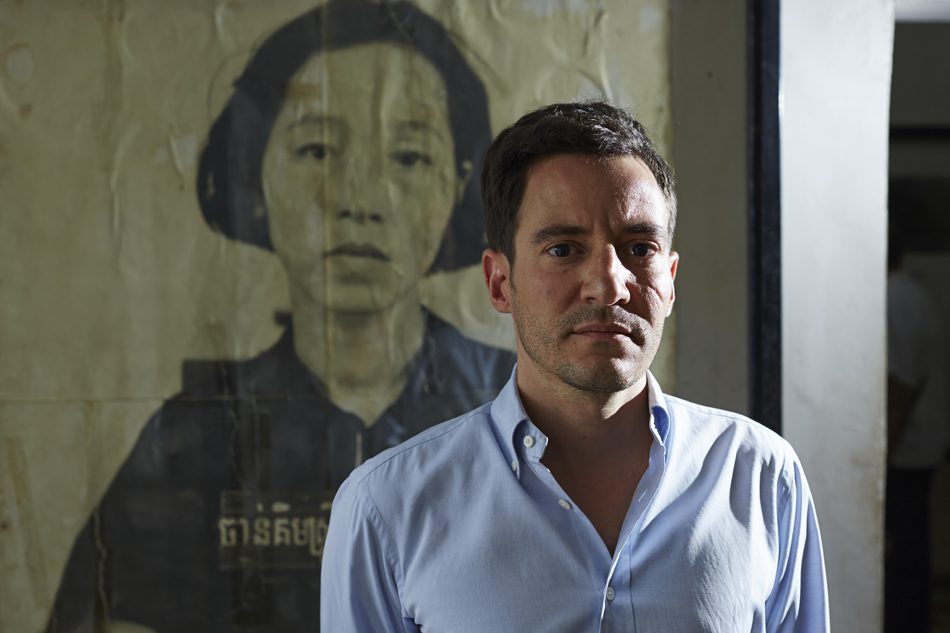Former Khmer Rouge Tribunal lawyer Andrew Ianuzzi talks Nuon Chea, Dr Dre and his decision to leave Cambodia’s “bad Gilbert and Sullivan”
By Daniel Otis
A show trial is a trial where the outcome is determined in advance, and you just go through the motions – and this is a very expensive show trial.”

Court jester? Andrew Ianuzzi says his antics were an attempt to illustrate the farcical nature of the trial
Andrew Ianuzzi lights another cigarette. Fiery and articulate, he speaks with a manic earnestness, mixing humour and profanities with byzantine legalese. The Phnom Penh Post has described the lawyer as being “cut out of a John Grisham novel”.
“I’ve never read a John Grisham novel,” Ianuzzi, 38, says. “I would have preferred if the Post said Raymond Chandler.”
Citing persistent government interference, Ianuzzi and colleagues Michiel Pestman and Jasper Pauw resigned from the Extraordinary Chambers in the Courts of Cambodia (ECCC) in December. The ECCC is trying surviving Khmer Rouge leaders for crimes allegedly committed during the regime’s three-year, eight-month rule. The three lawyers were part of the team representing Nuon Chea, aka “Brother Number Two” – Pol Pot’s one-time right-hand man and the highest-ranking Khmer Rouge leader to be brought before the ECCC.
“He’s a lovely guy in private,” Ianuzzi says. “He is very much a family man.”
The frail 86-year-old sits through most proceedings in large tortoiseshell sunglasses and a ratty beanie.
“He believes in what he did – he’s an unrepentant communist,” Ianuzzi says. “Nuon Chea has no illusions about his case. He knows he’s going to be convicted for whatever they say he did, and he knows he’s going to die in jail.”
After graduating from Brooklyn Law School in 2002, Ianuzzi worked in commercial law before joining the Special Court for Sierra Leone in 2004.
In Freetown, Dutch defence attorney Michiel Pestman immediately took the young American under his wing.
“In my mind, there’s something romantic about the idea of being a criminal defence lawyer,” Ianuzzi says. “It’s more interesting, less evangelical than prosecution work… I think it just kind of fits with my personality.”
When Pestman’s Amsterdam-based firm was offered Nuon Chea’s case in 2007, Ianuzzi was brought along as a legal consultant.
“When I arrived here in 2007, I lacked the historical knowledge and the political awareness to know that the tribunal was doomed to fail from the start.”
At the ECCC, Ianuzzi established himself as an unrelenting agitator, filing numerous procedural complaints and penning criticisms of what what the team considers to be pro-prosecution ECCC judges and meddling Cambodian politicians. The team asked the ECCC to sanction Prime Minister Hun Sen for publicly declaring their client a murderer. The team also routinely attempted to discuss links between senior government officials and the Khmer Rouge.
In 2012, Ianuzzi’s courtroom behaviour became increasingly unorthodox.
In June, he wore a pin reading ‘I DADA’ on his court robes. After being ordered to remove it, he explained that the badge referred to “the early 20th century movement that rejected logic and reason in favour of nonsense, irrationality and chaos”.
In particular, Ianuzzi drew the ire of former New Zealand governor-general, Judge Silvia Cartwright. He joked about her damehood, and accused Judge Cartwright of mouthing “blah, blah, blah” while Ianuzzi was speaking, the latter quoted hip-hop legend Dr Dre: “Some musicians cuss at home, but are scared to use profanity when up on the microphone.”
Ianuzzi regularly had his microphone silenced. In December, moreover, he was ejected for likening court proceedings to “a very bad Gilbert and Sullivan”.
The court filed three complaints to Ianuzzi’s bar association, citing “a consistent pattern of professional misconduct”. All complaints were dismissed.
“I did everything on purpose,” Ianuzzi says. “Once I went beyond that point in my mind of thinking that I could affect any change in the courtroom, I thought, OK, then really, my role will be to highlight the absurdities, to draw attention to them.”
One can argue that by eschewing decorum, Ianuzzi and his team spent more time drawing attention to themselves than defending their client, thus contributing to the court’s perceived ineffectuality, rather than highlighting it. While there is no doubt that the ECCC is seriously flawed, the constructiveness of Ianuzzi’s irreverent courtroom antics remains to be seen.
“I don’t think I could have made it any more farcical than it already is,” Ianuzzi says. “If I’ve spent 25 out of 30 minutes examining witnesses on completely orthodox terms, and then I spend the last five minutes talking about political interference and quoting rappers, then everything that happened in the 25 minutes is somehow forgotten and dismissed… If this was a normal case, and you said to me, ‘You’re grandstanding, you’re showboating, you’re cheapening your legitimate questions with these kind of stunts,’ then I’d say, ‘Yes, you’re right.’ But those kind of arguments apply in a normal situation. A different kind of situation calls for a different kind of approach.”
“It was a long time coming, really, my decision to quit,” Ianuzzi says. “Obviously, like any decision, it’s a combination of things… but ultimately and primarily, it’s to do with the fact that I don’t believe in this court any more – if I ever did.”
According to Ianuzzi, Nuon Chea didn’t protest his departure.
“Just before I left,” Ianuzzi says, “he said something like, ‘Justice is for the powerful’.”
Perhaps Nuon Chea was speaking from experience.
I asked Ianuzzi for parting words. Always the Marlowe, the lawyer remains intractable: “There’s this good Bansky quote where he says, ‘When the time comes to leave, just walk away quietly and don’t make any fuss.’ In court, I was going to say something like that. Well, I don’t entirely agree with the going away quietly bit, but I certainly don’t think the court is worth making a fuss about any more.” Ianuzzi opens another pack of cigarettes. “I didn’t get to say that.”

